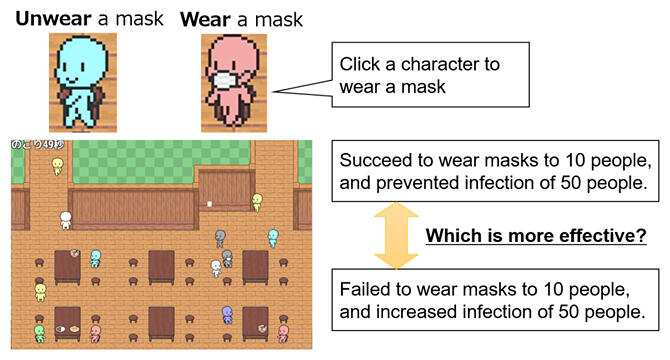A research group consisting of Associate Professor Masateru Tsunoda from the Faculty of Informatics, Kindai University, Hideaki Nobata (a fourth-year student at the time of the research), and Assistant Professor Keitaro Nakasai of the Department of Information Engineering, National Institute of Technology, Kagoshima College, has announced the results of their study, which found that subjects who were shown negative expressions regarding the effectiveness of mask-wearing in a game were more motivated to change their behavior compared to those who were presented with positive expressions. The researchers developed a serious game where players aimed to increase the number of people wearing masks within a set time frame. The results were displayed either positively or negatively, and participants completed a questionnaire to assess which presentation conveyed a greater sense of urgency. The outcome of this study is expected to contribute to the creation of games that significantly improve awareness of social issues. The results were published in the Journal of the Japanese Society for Information and Systems in Education, Vol. 40, No. 1.

Provided by Kindai University
Serious games are computer games that aim to address social issues rather than solely serving as entertainment. These games are gaining recognition for their educational potential and raising awareness on important topics.
The research group investigated the impact of the framing effect on the effectiveness of serious games for raising awareness. The framing effect is a technique in which information is presented differently to influence decision-making, such as presenting the same issue in either a positive or negative light. As an illustration, a positive frame could be "10 people wore masks, preventing the spread of infection to 50 people," while a negative frame could be "10 people failed to wear masks, causing infection to spread to 50 people."
The group created a game where players have to encourage characters not wearing masks to put on masks within a set time limit by clicking on them. The research group conducted a study on 18 Japanese university students in their 20s who were majoring in informatics. Before the experiment, the subjects completed a survey that gauged their perceptions of wearing masks, using positive and negative expressions on a 10-point scale (higher value = more positive).
In the game, characters entered a restaurant and either wore or didn't wear masks. 100 characters appear, 60 wearing masks and 40 not wearing masks, entering the store randomly. Masks were removed during meals, but characters wearing masks before eating always wore them after. In a one-minute game, subjects were asked to click as many non-mask-wearing characters as possible (there was no multiplayer version).
It was confirmed that subjects had positive feelings about masks (mean of nine) before playing. They were divided into two groups: one showed positive expressions, the other negative. After playing, subjects answered a six-question questionnaire.
Results revealed the negative expression group had higher mean scores on a scale of 10 for the game's impact on their perception of not masking spreading COVID-19 and their decision to change their mask use. The mean for the former question was approximately 7.67 for the negative expression group and 5.89 for the positive expression group; the mean for the latter question was 5.22 for the negative expression group and 3.11 for the positive expression group.
Similarly, the negative expression group showed a higher mean score for the game's impact on their perception of the risk of spreading infection by not wearing masks.
Tsunoda commented "Negative framing in serious games like this one could increase awareness and the effect may extend beyond mask usage for COVID-19. The team is considering releasing the game for broader use."
This article has been translated by JST with permission from The Science News Ltd. (https://sci-news.co.jp/). Unauthorized reproduction of the article and photographs is prohibited.




